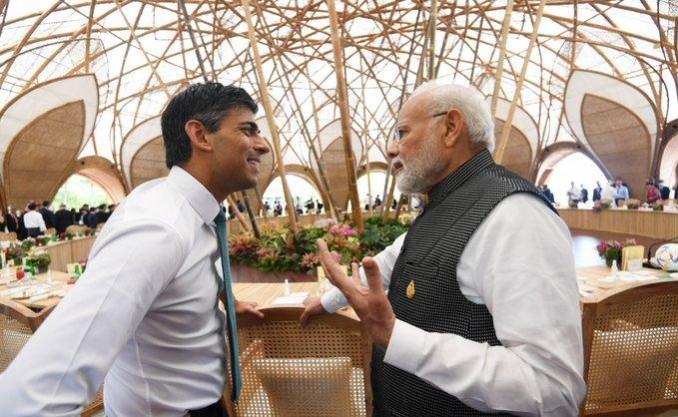After a gap of five months, the India-United Kingdom free trade agreement (FTA) negotiations are set to resume, as UK's Trade Secretary Kemi Badenoch arrives in India on Monday to hold talks with Commerce Minister Piyush Goyal.
Both the leaders are expected to begin the sixth round of FTA negotiations. The negotiations would aim to cut tariffs and facilitate financial and legal services by UK in India.

Badenoch will also meet business leaders to seek their feedback regarding the trade pact.
In a statement, the UK trade secretary said that she is visiting India to resume the sixth round of India-UK trade pact.
The negotiations are being held after a brief gap due to recent political developments in the UK. The last round of talks was held on July 29.
"The sixth round of talks are starting from December 12," the official said. Trade in goods, including passenger vehicles, is one of the areas under the negotiations, which started on January 13, 2022.
In a free trade agreement, two countries either significantly reduce or eliminate customs duties on the maximum number of goods and the UK is demanding duty concessions in the automobile sector too.
Last month, Commerce and Industry Minister Piyush Goyal said the agreement is a high priority for both countries. He added that things are progressing well and it will yield good results.
"We are all very well aware that it was progressing very fast until we had a little bit of a blip because of political happenings in the other country...We have a stable government...in office now (in the UK) and I am already in touch with my (UK) counterpart. We are working together to possibly have an in-person meeting also very soon but our teams are already engaged. Next month, the next round of negotiations are slated to happen," Goyal had said.
India and Britain launched negotiations for the FTA in January but the deadline was missed due to political developments in the UK. There are 26 chapters in the agreement, which include goods, services, investments and intellectual property rights.
Reduction or elimination of customs duty under the pact would help Indian labour-intensive sectors like textiles, leather, gems and jewellery to boost exports in the UK market. The UK is seeking duty concessions in areas like Scotch whiskey and automobiles.

The bilateral trade between the two countries increased to USD 17.5 billion in 2021-22 compared to USD 13.2 billion in 2020-21. India's exports stood at USD 10.5 billion in 2021-22, while imports were USD 7 billion.
India's main exports to the UK include ready-made garments and textiles, gems and jewellery, engineering goods, petroleum and petrochemical products, transport equipment and parts, spices, metal products, machinery and instruments, pharma and marine items.
Major imports include precious and semi-precious stones, ores and metal scraps, engineering goods, professional instruments, non-ferrous metals, chemicals and machinery.
The UK is also a key investor in India. New Delhi attracted foreign direct investment of USD 1.64 billion in 2021-22. The figure was about USD 32 billion between April 2000 and March 2022. In the services sector, the UK is one of the largest markets in Europe for Indian IT services.
(With inputs from agencies)








